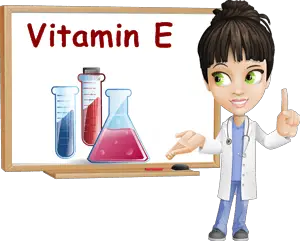This fat-soluble vitamin boasts powerful antioxidant properties, crucial for cell membrane health. Vitamin E protects lung cells from prolonged exposure to oxygen molecules which are highly reactive and can cause serious cell damage with mutagenic outcomes. In addition to this, it prevents the damage caused by reactive oxygen species to fatty acids and vitamin A. As a result of its potent antioxidant action, vitamin E actively supports the activity of the cardiovascular system and helps maintain a healthy nervous system. It further contributes to healthy skin and hair.
What are the benefits of vitamin E?
Vitamin E is a fat-soluble vitamin and can be found in generous amounts in nuts, seeds and vegetable oils. It is, among other things, a wonderful food additive used to prolong shelf life. Due to its powerful antioxidant properties, vitamin E helps prevent oxidation (due to contact with reactive oxygen molecules) and rancidity. The same antioxidant properties apply to us: the cells in our body come in contact with oxygen, which engenders an oxidation process. Oxidation leads to the degradation of cells and, consequently, of tissue integrity.

Antioxidants such as vitamin E, vitamin C or manganese counteract oxidation damage and help maintain healthy cells, tissues and organs. An adequate intake of vitamin E is thus essential for a good overall health because it prevents damage to the main structures that make up our body: cells. The vitamin further supports cardiovascular health. By maintaining adequate fluid levels, prevents blood platelets (thrombocytes) from aggregating and thus prevents blood clots.
In addition to this, a high intake lowers the risks of both stroke and heart attack.
Even more, some studied performed on mice showed that when applied to the skin, vitamin E can potentially help prevent skin cancer caused by overexposure to ultraviolet radiation from sunlight. Being an antioxidant, it reduces damage from sun radiation and thus contributes to healthier skin.
However, a reduced risk of skin cancer owed to photoprotective and cell reparative effects does not mean that you don’t need to use SPF protection any more – you still do.
Vitamin E has an intensive moisturizing effect and helps combat dry skin as well as improves the appearance of oily skin by helping regulate sebum production. However, use in skin care should be supported by a rigorous skin care regimen suited to your skin’s needs.

As a fat-soluble vitamin, it is only found in animal food sources and plant food sources which also provide important amounts of fats such as oily grains or cereals, fruits like avocado, nuts, seeds and some oily vegetables and especially vegetal oils. Together with fats, it exerts strong antioxidant and anti-aging effects directed primarily at the skin.
Moreover, this fat-soluble vitamin keeps the nervous system healthy by protecting the myelin sheath, a layer surrounding the axon (tail) of a neuron (nerve cell). This improves nerve cell connections and facilitates the transmission of electrical impulses between neurons. More recent research suggests that constantly supplying the body with vitamin E can prevent cognitive degeneration associated with old age and may even help slow down the evolution of Alzheimer’s disease.
Since its discovery in 1922, vitamin E has underwent intense study. Vitamin E is actually a generic name for a family of 10 compounds known as tocopherols and tocotrienols. Supplements available in pharmacies are actually a synthetic form of the vitamin: delta-tocopherol. As expected, our body thrives on natural vitamin E forms, such as those we get from sunflower seeds and oil as well as other dietary sources. Moreover, our liver recycles the natural form of vitamin E, while eliminating synthetic forms.
The American Journal of Clinical Nutrition has published some very interesting research results, stating that all forms of vitamin E present in our diet should be given proper attention, gamma-tocopherol included. For this reason, it is recommended that we also include nuts in our diet. Nuts appear to be an excellent source of gamma-tocopherol and regular consumption can be highly beneficial for cardiovascular health.
Vitamin E rich foods
Walnuts, almonds, hazelnuts, pecans, almonds, pine nuts, peanuts, cashews and all varieties of nuts are great dietary sources of vitamin E. Generous amounts of the essential nutrient can also be found in olive oil, sunflower seed oil, wheat germ oil, grapeseed oil, almond oil, canola oil, sesame oil and most vegetal oils. Sunflower seeds, sesame seeds, pumpkin seeds also count as vitamin E-rich foods. Avocado, pumpkin, mango, beet greens, spinach, broccoli are also good sources. Supplementation is rarely required because of the variety of vitamin E-rich foods available.
